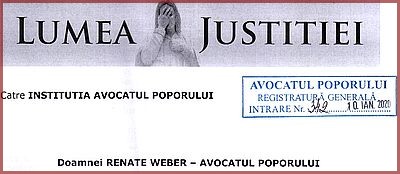DOWN WITH THE SECURITY – Lumea Justitiei notifies the Ombudsman on the non-constitutionality of GEO 6/2016 whereby a military unit of the Romanian Inteligence Office was autorized to intercept millions of romanians. The Nationl Centre of the Interception of Communications was introduces in the romanian law in 2016 by the Ciolos Government, although this cetre had been active for years within the Romanian Inteligence Office, without any establishment law (The Notification)
 UPDATE 10 January 2020 – On Friday, 10 January 2020, Lumea Justitiei Editors submitted to the registration office of the Ombudsman institution, as we announced, the official notification registered under No. 342 of 10 January 2020 (see copy below).
UPDATE 10 January 2020 – On Friday, 10 January 2020, Lumea Justitiei Editors submitted to the registration office of the Ombudsman institution, as we announced, the official notification registered under No. 342 of 10 January 2020 (see copy below).
Lumea Justitiei Editors will submit on Friday, to the Ombudsman institution, a request for Mr. Renate Weber, Ombudsman, to urgently notify the Constitutional Court of Romania on the non-constitutionality of GEO No. 6/2016 (the Pruna Ordinance) whereby the former Ciolos Government reintroduced the Romanian Intelligence Service in the activity of interception of millions of citizens.
 More precisely, in 2016 the Constitutional Court issued Decision No. 51/16.02.2016 whereby it eliminated the Romanian Intelligence Service from among the criminal prosecution bodies which intercepted communications under an abusive interpretation of a legal provision. To save the monopoly of the Romanian Intelligence Service in the interception of communications, the Ciolos Government issued “like a thief in the night”, without any public debate, GEO No. 6/2016 whereby it granted again to the Romanian Intelligence Service a right of monopoly on interceptions. What is very serious is that the Ciolos-Pruna Ordinance introduced for the first time in the public law of Romania the expression “the National Centre for the Interception of Communications” within the Romanian Intelligence Office – which had been unlawfully active for years – in order to thus authorize the secret military unit of the Romanian Intelligence Service hidden behind this name to continue to operate as a “national authority” on the interception of communications.
More precisely, in 2016 the Constitutional Court issued Decision No. 51/16.02.2016 whereby it eliminated the Romanian Intelligence Service from among the criminal prosecution bodies which intercepted communications under an abusive interpretation of a legal provision. To save the monopoly of the Romanian Intelligence Service in the interception of communications, the Ciolos Government issued “like a thief in the night”, without any public debate, GEO No. 6/2016 whereby it granted again to the Romanian Intelligence Service a right of monopoly on interceptions. What is very serious is that the Ciolos-Pruna Ordinance introduced for the first time in the public law of Romania the expression “the National Centre for the Interception of Communications” within the Romanian Intelligence Office – which had been unlawfully active for years – in order to thus authorize the secret military unit of the Romanian Intelligence Service hidden behind this name to continue to operate as a “national authority” on the interception of communications.
However, in the public legislation of Romania there is no previous enactment under which the National Centre for the Interception of Communications was established, except for a secret decision of the Supreme Council for National Defence (so far unknown) which, according to official sources from the Romanian Intelligence Service, granted to this centre the capacity of – mind you – “national authority” in interceptions. It is very well known that the Supreme Council of National Defence is an administrative body which cannot legislate; moreover, the Pruna Ordinance could not provide regulations in relation to state institutions and fundamental human rights, because under Article 115 of the Constitution the Government is prohibited from issuing ordinances in these areas. Moreover, both under the secret decision of the Supreme Council for National Defence and under GEO 6/2016, the role of the Parliament of Romania – the sole legislative power of the country, which could legislate on constitutional laws, the state institutions and the fundamental human rights, was undermined.
It is astonishing that the Pruna Ordinance, as GEO 6/2016 is known, has never been subject to parliamentary control, and it was hidden in the drawers of the Chamber of Deputies, although it had effects, while the Romanian Intelligence Service, run by Eduard Raul Hellvig (who does not want to turn this institution into a democratic one and keeps it at a low level of public trust) continues to allow the performance of all interceptions in Romania through the National Centre for the Interception of Communications which, we repeat, has never been established under any law.
Moreover, in any democratic European country the monopoly of interceptions is ensured by independent authorities, not at all by an intelligence service. Unfortunately, although the establishment of a national independent authority of interceptions was attempted under the law ever since 2007, the intelligence service proved to be more convincing that the Members of the Parliament, and the Romanian Intelligence Service maintained its monopoly outside any effective civil control.
We publish below the full wording of the notice that Lumea Justitiei Editors will submit on Friday, 10 January 2020 to the Ombudsman:
“Attn : Ms. RENATE WEBER – OMBUDSMAN
Dear Madam,
.... we are hereby asking you:
TO REFER DIRECTLY TO THE CONSTITUTIONAL COURT OF ROMANIA A PLEA ON THE NON-CONSTITUTIONALITY
of the provisions regarding the National Centre for the Interception of Communications in GEO No. 6/2016 on certain measures for the enforcement of technical supervision warrants issued in criminal proceedings, as published in the Official Journal of Romania No. 190/14.03.2016
which provisions infringe the following Articles of the Constitution of Romania:
- Article 21(3) on the right to a fair trial;
- Article 26 on privacy;
- Article 28 on the secrecy of correspondence;
- Article 61(1) – the Parliament is the sole legislative authority of Romania;
- Article 115(6) on the interdiction to issue emergency ordinances concerning the status of the State’s fundamental institutions, the freedoms and duties provided by the Constitution;
In fact,
By seriously infringing the international pacts and treaties concerning the right to a fair trial, as such are provided in the Convention for the Protection of Human Rights and Fundamental Freedoms which was ratified by the Parliament of Romania in 1994, and the mandatory provisions of the decisions handed down by the European Court of Human Rights in Strasbourg (see cases such as “Dumitru Popescu vs Romania"; "Calmanovici vs Romania"; "Valentino Acatrinei vs. Romania" etc), the Romanian Intelligence Service (i.e., the successor of the former Securitate from the Communist era) continued, with the support/inaction of political factors and Presidents of Romania, to preserve and strengthen its position as national authority for the interception of any communications whatsoever, circumventing any kind of effective civil control.
Thus, ever since 1989, the Romanian Intelligence Service, instead of ensuring the national security - which also comprises the right to a fair trial, privacy and secrecy of correspondence, and the judicial security of Romanian citizens - has accepted, with the complicity of political factors, to be granted a capacity of national authority for the interception of communications and the national authority in the field of cyber intelligence (Internet control), under secret enactments outside the legislative process; thus, it seriously and inexcusably undermined the constitutional role of the Parliament of Romania as sole legislative authority of the country.
Thus, based on secret decisions of the Romanian Supreme Council of National Defence (CSAT) (an administrative body which does not have the right to legislate) issued during the terms of office of former President Traian Basescu, two structures with no legal personality and which are in fact military units were created within the Romanian Intelligence Service, as follows:
- the National Centre for the Interception of Communications, established under CSAT Decision No. 0068/2002 whereby the Romanian Intelligence Service was appointed as “national authority for interceptions and relationships with the telecommunication operators” (as mentioned in the preamble of the Cooperation Protocol between the Prosecutor’s Office of the High Court of Cassation and Justice and the Romanian Intelligence Service from February 2009, which was declassified on 29 March 2018);
This military unit intercepts all telephone communications in Romania (i.e., fixed line, GSM, etc.).
- the National Cyberint Centre established by another secret decision of CSAT, most likely in 2009, whereby the Romanian Intelligence Service was appointed as “national authority in the field of cyber intelligence”.
This military unit intercepts all online communications (i.e., website databases, chats, electronic mail, etc.);
In fact, there is no public enactment in the Romanian law whereby such entities would have been established, although these structures, which claim to be “national authority” in the field of any communications whatsoever, blatantly interfere with the fundamental human rights, which they restrict without relying on any authorization law issued by the Parliament of Romania which would establish them as institutions and provide them with an organizational structure and operational rules.
In fact, the Romanian Intelligence Service’s inclination for gross infringement of human rights in Romania has been proven publicly when the cooperation protocols executed in 2009 and then in 2016 between the Prosecutor’s Office of the High Court of Cassation and Justice and the Romanian Intelligence Service were unveiled. These protocols were declared unlawful (in full as regards the 2009 protocol and partially as regards the 2016 protocol) by the Constitutional Court of Romania under Decision No. 26/2019 published in the Official Journal of Romania No. 193/12/03/2019.
It is a well-known fact that, by an unlawful cooperation with the main prosecutor’s offices, in particular the National Anticorruption Directorate, the Romanian Intelligence Service was an accomplice in generating immeasurable abuses, affecting the right to life, dignity and a fair trial for thousands of Romanian citizens who abusively underwent judicial proceedings prohibited by the law and in which the Romanian Intelligence Service assigned itself a role of criminal prosecution body.
Thus, further to Constitutional Court’s Decision No. 51/16.02.2016 published in the Official Journal of Romania No. 190/14.03.2016, the Romanian Intelligence Service was prohibited to continue with activities which are specific to criminal prosecution bodies, and which it used to perform in the line of interference in court cases and interception of communications, mainly via the National Centre for the Interception of Communications (a military unit).
Further to Constitutional Court’s Decision No. 51/16.02.2016, the Romanian Intelligence Service had to abandon its unlawful activity of criminal prosecution. However, to cover the unlawfulness of its capacity as “national authority” in the field of interception of communications, GEO No. 6/2016 on certain measures for the enforcement of technical supervision warrants issued in the criminal proceedings was issued under the Ciolos Government and published in the Official Journal of Romania No. 190/14.03.2016.
GEO No. 6/2016 is not constitutional, and it is inexplicable that, since 2016, this Ordinance has never been subject to any parliamentary control under Article 115(7) of the Constitution of Romania. This Ordinance introduced for the first time in the public legislation of Romania the expression “The National Centre for the Interception of Communications from the Romanian Intelligence Service”, although before the issuance of this Ordinance, as mentioned above, there was no public enactment to provide for the establishment of the National Centre for the Interception of Communications.
* * *
More precisely, the following wording was inserted in GEO 6/2016:
Article II. – Law No. 304/2004 on judicial organization, as republished in the Official Journal of Romania, Part I, No. 827 of 13 September 2005, as further amended and supplemented, shall be amended and supplemented as follows:
1. After Articolul 30 a new article shall be inserted, i.e. Article 30^1, which shall read as follows:
Article 30^1. - (1) Every half-year or whenever necessary, the President of the High Court of Cassation and Justice or one of the judges appointed in this respect by such President shall verify the way in which the technical supervisions performed by the criminal prosecution bodies are applied in the National Centre for the Interception of Communications provided at Article 8(2) of Law No. 14/1992 on the organization and operation of the Romanian Intelligence Service, as further amended and supplemented.
(2) The verification provided at para. (1) shall be made under the conditions provided in the Regulation for the organization and administrative operation of the High Court of Cassation and Justice."
Article IV. – Law No. 14/1992 on the organization and operation of the Romanian Intelligence Service, published in the Official Journal of Romania, Part I, No. 33 of 3 March 1992, as further amended and supplemented, shall be amended and supplemented as follows:
1. At Article 8, after paragraph 1 two new paragraphs shall be inserted, i.e. para. (2) and (3), which shall read as follows:
"For the relationship with the providers of public electronic communications, the National Centre for the Interception of Communications of the Romanian Intelligence Service is appointed to obtain, process and store information in the field of national security. At the request of criminal prosecution bodies, the Centre shall ensure their direct and independent access to the technical systems in order to enforce the technical supervision provided at Article 138(1)(a) of the Criminal Procedure Code. The verification of the way in which these technical supervisions are enforced within the National Centre for the Interception of Communications shall be performed in accordance with Article 30^1 of Law No. 304/2004 on judicial organization, as republished, as further amended and supplemented."
* * *
Even if Article II of the Ordinance refers to the National Centre for the Interception of Communications as being “provided at Article 8(2) of Law No. 14/1992 on the organization and operation of the Romanian Intelligence Service”, please note that the expression: “the way in which the technical supervisions performed by the criminal prosecution bodies are applied in the National Centre for the Interception of Communications provided at Article 8(2) of Law No. 14/1992 on the organization and operation of the Romanian Intelligence Service” is a legislative deception, because Article 8(2) of Law 14/1992 was introduced by the same Ordinance.
As a result of this legislative deception, if today the amended Law 304/2004 is read separately, the citizens understand that the Centre would have been established ever since 1992, under Article 8 of Law 14/1992, when in fact Article 8 introduced for the first time in the Romanian law the expression “the National Centre for the Interception of Communications” under the same GEO No. 6/2016. Practically, by GEO No. 6/2016 a major legislative deception was committed, so that those who read Law 304/2004 today would believe that the Centre would have been established ever since 1992, when in fact so far it has never been established on the basis of a public enactment.
To conclude, the signatories of GEO No. 6/2016 (i.e., the former Prime Minister Dacian Julien Ciolos and the former Minister of Justice, Raluca Alexandra Pruna) introduced in the Romanian law an institution, i.e. the National Centre for the Interception of Communications – which does not exist from a legal perspective, meaning that it has never acquired a legal personality and has never been established through a public enactment having the power of a law, which would be binding on the citizens of Romania.
To legislate on the establishment of an institution under an emergency ordinance was a breach of Article 115(6) of the Constitution of Romania, according to which: “Emergency ordinances cannot be adopted in the field of constitutional laws, or affect the status of fundamental institutions of the State...”
As GEO No. 6/2016 authorized the National Centre for the Interception of Communications to perform activities which restrict the right to privacy, the secrecy of correspondence and the right to a fair trial, we deem that both Article 115(6) of the Constitution, prohibiting the adoption of emergency ordinances in the field of constitutional laws, fundamental rights and freedoms, and the Articles in the Constitution listed in the preamble hereof have been infringed.
Since the activity of the National Centre for the Interception of Communication within the Romanian Intelligence Service continues to be carried on without any restrictions to this day, and the communications of millions of citizens are intercepted through this so-called “national authority” which does not operate under an authorization law issued by the Parliament of Romania, we are asking you to urgently refer to the Constitutional Court of Romania the matter of the non-constitutionality of GEO No. 6/2016.”
*Read here the Romanian version of this article
Adauga comentariu
DISCLAIMER
Atentie! Postati pe propria raspundere!
Inainte de a posta, cititi aici regulamentul: Termeni legali si Conditii









 Judecatoarea Camelia Bogdan si ale ei judecati. Am vazut si eu o „judecata” a doamnei
Judecatoarea Camelia Bogdan si ale ei judecati. Am vazut si eu o „judecata” a doamnei 








Comentarii